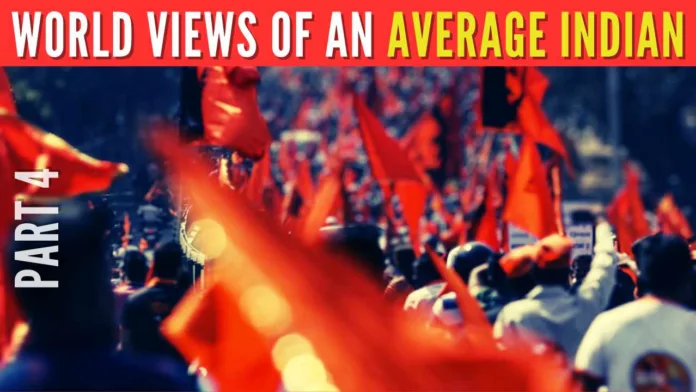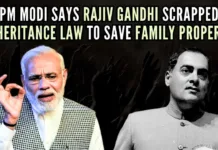
The previous 3 parts of the article can be accessed here Part 1, Part 2, Part 3. This is the fourth part
Pseudo-seculars will lose badly if Hindus vote together
Why are many practicing Hindus pseudo-secular, actively supporting anti-Hindu political parties and alliances?
I’m not, for a moment, suggesting that Hindus should support political parties espousing the cause of Hindus. I’m only reflecting on why consolidation of anti-Hindu votes happens substantially when non-Hindus vote, while a large percentage of Hindus vote in favour of political parties taking an actively anti-Hindu stance.
The best example is the state of Tamil Nadu where DMK is rabidly anti-Hindu, but a large majority of the voters are practicing, even devout Hindus.
Other examples are the support that practicing Hindus across India give to the Congress, Communists, TMC, AAP, BRS, etc., which are openly pseudo-secular.
And then there are parties like the AIMIM, IUML, NC, PDP, etc., which are avowedly pro-Muslim taking anti-Hindu positions.
Many people are intrigued by the large (consequential) percentage of practicing Hindus actively supporting the anti-Hindu stance of these pseudo-secular and anti-Hindu political parties. This article is an attempt to understand this paradox.
It has something to do with the pacifist nature of Hinduism vis a vis other religions, esp Abrahamic religions (which constitute the majority population in the world, and a significant minority in India).
Christianity and Islam sought to convert the entire world into their respective religions. Whereas Hinduism (Sanatan Dharm) didn’t try to convert people of other religions to its faith. In fact, there is no formal or easy way to convert any non-Hindu to Hinduism.
Hinduism is in fact not a formal religion but a way of life (started when no other formal religion existed), but was forced to be reckoned a religion in the presence of other religions, just to differentiate itself from other religions, and so got its name.
If Hindus were to vote as a vote bank, pseudo-seculars would lose very badly. But Hindus are not really interested in running politics on the basis of religion.
In recent years, if Hindus have started voting as a vote bank, it is mainly to counter pseudo-seculars gaining enormous ground in politics, and acting against the interest of the Hindus. It’s just an act of self-defence.
Hinduism, by nature, is an open religion. It is not just tolerant, and accepting, but all-embracing. The other Abrahamic religions openly denounce other faiths and their practitioners in their main scriptures.
Hinduism does no such thing. It says there are many paths leading to God and other religions show the alternative paths.
In fact, there is no single version of Hinduism. One of the main versions, Advaita, says every individual is part of God. Most Hindus worship nature consisting of the sun, the moon, hills, plants, animals, fish, etc., as God.
And then there are the Hindus who have no faith in God. Such openness is unthinkable in the other religions.
Hindus, by nature, are also pacifists, wanting to avoid religious wars, conflicts, violence, etc.
Some, like Mahatma Gandhi, went to the extent of arguing that, if violent conflicts arose with people of other religions, it’s better for Hindus to become submissive and either give up their lives gladly or convert to other religions, just to avoid bloody conflicts.
His possible hope was that this act of submission could change the hearts of those violently opposing Hinduism. But events after independence and partition and the subsequent geopolitical actions of cantankerous countries like Pakistan, China, Afghanistan, etc., have proved that this assumption of pacifism is misplaced.
Consequently, the percentage of Hindus who were willing to follow Gandhi’s pacifist ways has come down, though there are still some such pacifists.
There is also another significantly high percentage of pseudo-seculars who are not exactly Gandhi’s followers, but use Gandhi as a cover, taking anti-Hindu positions for vote bank politics and financial gains.
The problem with the ‘Gandhi-follower pacifists’ is that they are not honestly admitting that they are secular not because that is the right path, but because they just want to avoid conflicts with the anti-Hindus and so are submitting themselves at the altar of pseudo-secularism.
So, the Hindus supporting pseudo-secular parties are either misguided followers of Gandhi or political self-seekers and their followers.
What is going on now is a conflict between the anti-Hindus and pacifists on the one side and Hindu non-pacifists on the other.
More and more pacifists are becoming non-pacifists and most of the youth are non-pacifists because they are realizing that conflicts between pacifists and non-pacifists are unavoidable, as we’re not living in Gandhi’s times. So, they think, that if conflicts are inevitable, they better be on the side of truth. Also, it is the side of the non-pacifists that is getting stronger; so, nothing can be gained by taking the side of pacifists. This is why pseudo-secularism has no future in India.
Until there emerges a genuinely secular set of politicians who are willing to support the side of truth regardless of religion, the side of the non-pacifists among Hindus is likely to get stronger by the day. And religion is likely to be at the centre stage of politics.
Note:
1. Text in Blue points to additional data on the topic.
2. The views expressed here are those of the author and do not necessarily represent or reflect the views of PGurus.
For all the latest updates, download PGurus App.
- How BJP can get 33%+ vote share in TN - April 1, 2024
- A transparent, equitable electoral funding alternative - March 19, 2024
- How TN BJP can come to No. 1 or No. 2 in 2024 LS polls - January 11, 2024










